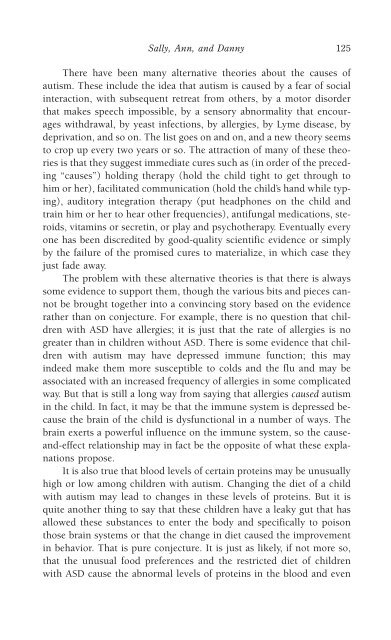978-1572305441
autism
autism
Create successful ePaper yourself
Turn your PDF publications into a flip-book with our unique Google optimized e-Paper software.
Sally, Ann, and Danny 125<br />
There have been many alternative theories about the causes of<br />
autism. These include the idea that autism is caused by a fear of social<br />
interaction, with subsequent retreat from others, by a motor disorder<br />
that makes speech impossible, by a sensory abnormality that encourages<br />
withdrawal, by yeast infections, by allergies, by Lyme disease, by<br />
deprivation, and so on. The list goes on and on, and a new theory seems<br />
to crop up every two years or so. The attraction of many of these theories<br />
is that they suggest immediate cures such as (in order of the preceding<br />
“causes”) holding therapy (hold the child tight to get through to<br />
him or her), facilitated communication (hold the child’s hand while typing),<br />
auditory integration therapy (put headphones on the child and<br />
train him or her to hear other frequencies), antifungal medications, steroids,<br />
vitamins or secretin, or play and psychotherapy. Eventually every<br />
one has been discredited by good-quality scientific evidence or simply<br />
by the failure of the promised cures to materialize, in which case they<br />
just fade away.<br />
The problem with these alternative theories is that there is always<br />
some evidence to support them, though the various bits and pieces cannot<br />
be brought together into a convincing story based on the evidence<br />
rather than on conjecture. For example, there is no question that children<br />
with ASD have allergies; it is just that the rate of allergies is no<br />
greater than in children without ASD. There is some evidence that children<br />
with autism may have depressed immune function; this may<br />
indeed make them more susceptible to colds and the flu and may be<br />
associated with an increased frequency of allergies in some complicated<br />
way. But that is still a long way from saying that allergies caused autism<br />
in the child. In fact, it may be that the immune system is depressed because<br />
the brain of the child is dysfunctional in a number of ways. The<br />
brain exerts a powerful influence on the immune system, so the causeand-effect<br />
relationship may in fact be the opposite of what these explanations<br />
propose.<br />
It is also true that blood levels of certain proteins may be unusually<br />
high or low among children with autism. Changing the diet of a child<br />
with autism may lead to changes in these levels of proteins. But it is<br />
quite another thing to say that these children have a leaky gut that has<br />
allowed these substances to enter the body and specifically to poison<br />
those brain systems or that the change in diet caused the improvement<br />
in behavior. That is pure conjecture. It is just as likely, if not more so,<br />
that the unusual food preferences and the restricted diet of children<br />
with ASD cause the abnormal levels of proteins in the blood and even



